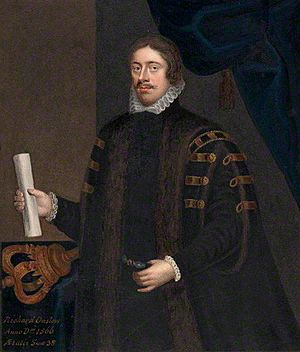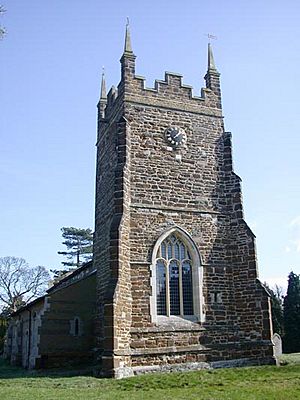Humphrey Winch facts for kids
Sir Humphrey Winch (born 1555 – died 1625) was an important English politician and judge. He had a successful career in both Ireland and England. However, his good name was badly affected by the Leicester witch trials in 1616. These trials led to the wrongful execution of several innocent women.
Contents
Family Life
Humphrey Winch was born in Bedfordshire, England. He was the second son of John Winch. Humphrey married Cicely Onslow. Her father was Richard Onslow, who was a Speaker of the House of Commons.
Humphrey and Cicely had two children who lived to adulthood. One of their children was Onslow. Onslow later became the father of Sir Humphrey Winch, 1st Baronet. Many years later, famous people like Anne, Duchess of Cumberland and Strathearn were also descendants of this family.

Early Career in Politics
Humphrey Winch studied at St John's College, Cambridge. In 1581, he became a barrister, which is a type of lawyer. He later became a senior member of Lincoln's Inn, a famous legal society.
He was supported by a powerful person named Oliver St John, 3rd Baron St John of Bletso. Because of this support, Winch was chosen to be a Member of Parliament (MP) for Bedford in 1593. He served in Parliament for many years until 1606.
Early in his time in Parliament, he was part of a group called the Puritan faction. In 1593, he upset Queen Elizabeth I. He supported a plan to discuss who would become the next ruler after the Queen. The Queen had strictly forbidden any talk about this topic. The meetings about this plan even happened in his own legal offices.
Compared to others, Winch's punishment was not too harsh. He was not allowed to leave London for a while. But he could still attend Parliament. After this, he only spoke about topics that were not controversial.
Becoming a Judge
In 1606, even though he had upset the Queen before, King James I was told that Winch would be a good judge. This was because of his legal skills and honesty. He was made a senior lawyer called a serjeant-at-law and was also knighted. Then, he was appointed as the Chief Baron of the Irish Exchequer in Ireland. This was a very important legal job.
Humphrey Winch received excellent reviews as a judge. People said he was "understanding and painstaking." A famous thinker named Francis Bacon said Winch was a great example for other judges. He was quick, hardworking, and efficient. In 1607, he helped to restart the King's Inns, an important legal institution in Ireland. He was very dedicated to his work. He regularly traveled to hold court sessions and attended the Court of Castle Chamber. This court was similar to the Star Chamber in England.
After two years, he was promoted again. He became the Lord Chief Justice of the King's Bench in Ireland.
Like many English officials, Winch did not like the climate in Ireland. He also complained about not having enough staff and the low fees he received. From 1610, he tried to return to England quickly. The government in Dublin did not want to lose such a valuable official. But in 1611, he was moved to the English Court of Common Pleas. He returned to Ireland for official duties in 1613. He was considered an expert on Irish matters. He also served on special committees that advised the Privy Council on Irish affairs.
The Leicester Witch Trials
Winch's great reputation as a judge was seriously damaged in 1616. This happened during court sessions in Leicester. Fifteen women were accused of witchcraft. The only evidence against them came from a young boy named John Smith. He claimed they had put a spell on him.
The judges, Winch and Ranulph Crewe, believed the boy. Six of the accused women were sent to prison. But nine were found guilty and were executed.
A month after these executions, King James I visited Leicester. The King was very interested in witchcraft. He believed witches were real. However, he was also smart and could tell when someone was lying. He questioned the boy, John Smith. The King quickly declared that the boy was a fraud. The boy then admitted that he had lied. The five women who were still alive in prison were released.
Later Life and Death
Even though his reputation was hurt by the witchcraft trial, Winch continued to serve as a judge. He died suddenly in February 1625 from a stroke. He was buried in St Mary's Church, Everton. There is an impressive memorial there for him.
In his will, he apologized to his wife for the "poor estate" he would leave her. She lived for a few more years after him. He had often complained about not being paid enough. While his wealth might not have been huge for a judge of his time, he did own several properties. Besides Everton, he had land in Potton, Bedfordshire, and Gamlingay in Cambridgeshire.
| Legal offices
|
||
|---|---|---|
| Preceded by James Ley |
Lord Chief Justice of Ireland 1608–1611 |
Succeeded by John Denham |
 | Anna J. Cooper |
 | Mary McLeod Bethune |
 | Lillie Mae Bradford |


